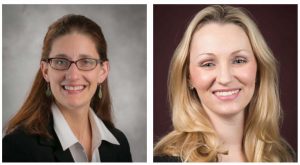Christine Pfund and Jenna Rogers of the School of Education’s Wisconsin Center for Education Research (WCER) are co-investigators on a project that aims to reduce inequality in science, technology, engineering, mathematics, and medical sciences (STEMM) fields through culturally aware mentor training.

The principal investigator for the project is Angela Byars-Winston, a professor in the UW–Madison Department of Medicine. Pfund is a senior scientist for WCER, and Rogers is an assistant scientist. Their project, titled “Reducing STEMM Inequality via Culturally Aware Mentoring,” is among 15 that were chosen to receive grants through UW–Madison’s Understanding and Reducing Inequalities Initiative.
The initiative is designed to support research that “moves beyond scholarship that just describes the causes and consequences of inequalities,” where the emphasis is also on “producing real-word, evidence-based solutions for reducing a host of inequalities on the basis of race, ethnicity, gender, disability, economic standing, language, minority status, country of origin, and immigration status.”

The “Reducing STEMM inequality via culturally aware mentoring” project addresses inequality in STEMM representation by investigating how culturally aware mentor training increases mentoring effectiveness and underrepresented groups’ student outcomes.
Since 2016, the study team has implemented a year-long mentorship education program focused on mentoring competencies and cultural awareness for the HHMI Gilliam Fellowship Program. As stated in the project description, this program is “a living laboratory of the diversity and inclusion issues commonly wrestled with in academia,” as largely white research mentors are paired with students in underrepresented groups.
“With three years of longitudinal data on 125 mentor-mentee pairs, the team is uniquely poised to elucidate the longitudinal impact of mentor training on these relationships and on student outcomes,” the project description adds. “Research findings will inform mentor training programs and practices in graduate STEMM education.”
Learn more about this project.